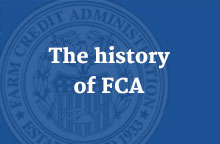
About FCA statutes and regulations
Statutes
Statutes are laws that have been enacted by Congress and signed by the president. The principal statute from which FCA derives its authority is the Farm Credit Act of 1971, which has been amended many times over the years.
This statute establishes the oversight, examination, regulatory, and enforcement authorities of FCA over the Farm Credit System. The statute also sets forth the purpose and authorities of all FCS institutions, including Farmer Mac.
Statutes are codified in the U.S. Code, which contains the general and permanent laws of the United States. The Farm Credit Act of 1971, as amended, is classified as 12 U.S.C. §§ 2001–2279cc.
Our statutes database provides access to the text of the Farm Credit Act of 1971, as well as to provisions applicable to FCA from other statutes. For a printer-friendly version of this information, see the FCA Handbook.
Regulations
FCA develops regulations (rules) to implement the Farm Credit Act and other relevant laws, to help the Farm Credit System fulfill its public mission, and to ensure that the FCS operates safely and soundly. Our regulations are available as part of a database. For a PDF file of the regulations, see the FCA Handbook. Like all federal regulations, our regulations have the force and effect of law.
Ordinarily, regulations are enacted according to the following process:
- Our staff prepares a proposed rule and submits it to the FCA board.
- If the board approves it, the proposed rule is sent to Congress for a 30-day review.
- When the review period expires, a notice of proposed rulemaking is then published in the Federal Register, which is the official publication for rules and notices of federal agencies. This notice explains the proposed rule and invites the public to comment within a specific period (usually between 30 and 90 days).
We review the comments we receive. - FCA officials then determine whether to (a) adopt the proposed regulation as final, (b) amend the proposed regulation before enacting it as final, or (c) withdraw the rule altogether.
- If the board approves a final rule, it is published in the Federal Register. Unless we prescribe a later effective date, the final rule usually takes effect after 30 days during which either body of Congress is in session. We place a notice in the Federal Register to inform the public of the regulation’s effective date.
In a few cases, we may either increase or reduce the steps involved. If we seek input from the public before making a specific regulatory proposal, we may hold a public hearing so that members of the public may share their views on a broad issue.
Or, as an alternative, we may publish an advance notice of proposed rulemaking in the Federal Register in which we solicit public input on a broad issue. Then, on the basis of the input provided during the public hearing or in response to the advance notice, we may develop a proposed regulation.
In rare instances, we may publish a rule without first soliciting public comment. The Administrative Procedure Act authorizes a federal agency to enact final rules without comment if it determines that notice and comment are “impracticable, unnecessary, or contrary to public interest.”



